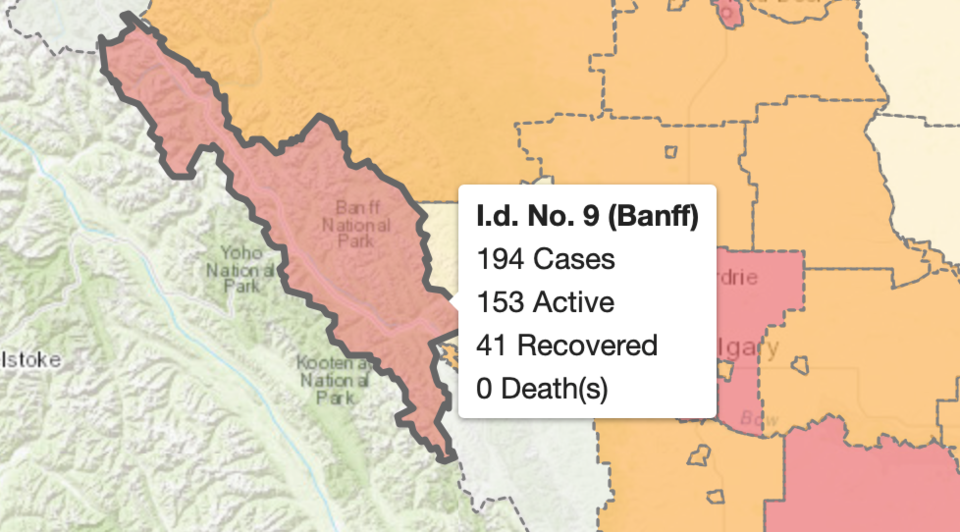BANFF – The Town of Banff has declared a state of local emergency as COVID-19 cases rapidly rise.
Town officials say a state of local emergency allows the municipality to reallocate or focus resources easier, be nimble in responding to rapidly changing circumstance, and gives powers to coordinate local organizations and assets in response to the emergency.
“In times of crisis, you need to take extraordinary measures – and this is certainly a dire situation for the people of Banff,” said Mayor Karen Sorensen, who declared the state of local emergency after a meeting with the Emergency Coordination Centre (ECC) late Wednesday (Nov. 25).
“Our region – Banff and Lake Louise – has the second-highest number of cases per capita in Alberta.”
Earlier in the day, the municipality decided to explore legislation to potentially limit hours for some businesses, and reduce the number of patrons in restaurants and bars, to help curb the escalation of COVID-19 cases.
After a three-hour in-camera council session, council directed administration to prepare temporary bylaws to address limiting hours of operation for business such as liquor stores and cannabis stores and businesses that offer counter, table and full food and beverage service, as well as reducing occupancy for restaurants and bars.
“Certainly, it is not a municipality’s responsibility to suggest that businesses should close, or mandate them to close, but we do have the option to look at our own bylaws and our operations of businesses within our municipality,” Sorensen said.
“There has been no real decision, as there would never be in-camera, on what that might look like, but council is very interested in learning more about what some options might be.”
The mayor specifically spoke to liquor stores.
“Currently, liquor sales stop at restaurants at a certain time, and businesses that serve liquor have to close at a certain time – and liquor stores have a completely different timeframe connected to them in terms of closure,” Sorensen said.
“Having a look at how we make those things more congruent, there’s an interest from council in looking at something like that.”
As of Wednesday, Banff and Lake Louise had 153 active COVID-19 cases, according to Alberta Health Services. Canmore had 52 cases and the MD of Bighorn had five.
Over the previous 24 hours, 1,265 new cases were identified province-wide, bringing the total number of active cases to 13,719.. There are 355 people in hospital due to COVID-19, including 71 in intensive care.
The Alberta government declared a state of public health emergency on Tuesday (Nov. 24) due to the rapidly increasing infections rates across the province.
Banff council is also looking to expand the mandatory mask bylaw, and has asked administration to prepare amendments to the bylaw to require outdoor mask wearing along the entire length of Banff Avenue within the townsite.
Sorensen said this is a starting point to a further discussion on masks.
“We want to use that tool that we’re already using and have some conversation around does it make sense to expand it, and if so, where that might be,” she said.
“There was discussion about different areas … when it does come back to a council meeting for discussion and debate on an actual bylaw presented, you may see lots of different discussion on that topic.”
In the face of rising COVID-19 numbers, Banff Town Hall, the upper level of 101 Bear St. and the Fenlands recreation centre will close on Friday (Nov. 27), until further notice.
In addition, signs will be immediately installed at both entrances to the townsite to communicate relevant COVID-19 information, such as case counts and restrictions, to residents and visitors.
Mayor Sorensen said council wants to take this opportunity to educate people at this point.
“There are no provincial travel restrictions, but we do think it is important that anybody who is coming into the town is very well aware of the seriousness of the situation we are in,” she said.
“We are in an enhanced status and we have a significant number of cases in town and we are working to keep our community safe.”
Council also wants administration to explore the possibility of offering assistance, and what that might entail, financial or otherwise, for businesses that choose to move to take-out only options, online shopping or temporarily close.
The Town of Banff will also reallocate, or share staff, to undertake the roles of safety ambassadors, municipal enforcement and other support services for COVID-19 responses as needed.
“We understand that services are changing in our own organization and it is always our intention to try to reallocate staff to a more necessary area if they are qualified to help out,” Sorensen said.
Choking back tears at Wednesday’s council meeting, Sorensen said she wants the public to know council and administration are doing everything they can to keep the community safe.
“These are hard times and when I hear things like our little town being in a state of emergency, it just really affects me,” she said choking back tears at the council meeting.
“Every councillor here and every administrator here cares deeply for this community, and there is nothing more important to any of us than the health and safety of our residents,” she added.
“We hope that we can continue to make good decisions moving forward, and that we get through this spike and that we start to se those numbers come down.”
Sorensen said the the state of local emergency will help draw attention to the need for help from the province of Alberta in terms of more local COVID testing capacity for a population with transportation challenges, and the need for expanded isolation space to address the uniquely high concentration of shared accommodation.
“We are seeing a response this week and we need to keep the pressure on,” she said.
The potential bylaw amendments council directed administration to draft will be discussed and debated at a special meeting of council on Monday (Nov. 30) at 1 p.m.



